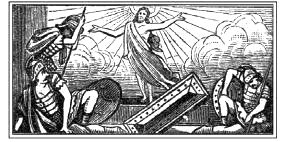
| Contents | Adiutor Laborantium Helper of Laborers |
Filius |

This hymn appears only in the Cotton manuscript, a pre-conquest English prayer book. Several old Irish manuscripts, such as the Leabhar Breac (14th century), attribute the hymn to St. Columba who was an Irish missionary to Scotland in the 6th century. According to the Irish manuscripts, St. Columba composed it on the way to the mill. He finished the hymn before he arrived at the mill and then, while he was working at the mill, he composed the Altus Prosator. The lines of Adiutor Laborantium follow in alphabetic order making what is sometimes called an abecedary.
|
| Adiutor laborantium, Bonorum rector omnium, Custos ad propugnaculum, Defensorque credentium, Exaltator humilium, Fractor superbientium, Gubernator fidelium, Hostis impaenitentium, Iudex cunctorum iudicium, Castigator errantium, Casta vita viventium, Lumen et pater luminum, Magna luce lucentium, Nulli negans sperantium, Opem atque auxilium, Precor ut me homunculum, Quassatum ac miserrimum, Remigantem per tumultum, Saeculi istius infinitum, Trahat post se ad supernam, Vite portum pulcherrimum, Xristus Iesus infinitum, Ymnum sanctum in saeculum, Zelo subtrahas hostium, Paradisi in gaudium. Per te, Christe Iesu, qui vivis et regnas. Amen. |
Helper of laborers Ruler of all good things, Guardian at the rampart Defender of believers, Exalter of the lowly, Breaker of the proud, Leader of the faithful, Enemies of the unrepentant, Judge of all judgements, Chastiser of the errant, Chaste life of the living, Light and Father of lights, Shining with great light, No refuser to those who hope, Help and assistance to all. I pray, though I am a weakling, Shattered and miserable, Rowing through tumult. His centuries are infinite, He pulls behind him to the upper Vine branch Live the fairest port Christ Jesus infinite A holy hymn to the ages With zeal you withdraw the enemy, Paradise in joy. Through Thee, Christ Jesus who livest and reignest. Amen. |
| From "A Pre-Conquest English Prayer-Book, Ed. Bernard James Muir, from the Cotton Galba and Cotton Nero MS from the 11th century). See also the Irish Liber Hymnorum. |
<- Prev |
Next-> |
